Something about the combination of “anime” and “murder” has always intrigued me. I stumbled upon Petit Depotto’s GNOSIA late in 2021, months after it had been released. I’ve always been a fan of “killing games,” the dark storylines and contrasting cartoony aesthetic of either the Danganronpa or the Zero Escape series being two of my all time favorite experiences. I used to be really afraid of horror movies and gratuitous violence, but there was something about making the bodies 2D and colorful that made it more palatable; SAW, but make it anime, with the cheesy dialogue and classic tropes all in tact, just get school girls and older women with big honkers. Watching optimistic characters slowly unravel and give into the despair of their circumstances is a thrill.
I’m talking about the “killing games” in particular (don’t you dare try to bring SQUID GAME into this), which I’ve always recognized as a branch of the visual novel genre. Killing games, to me, are built around colorful characters, a contained environment (school, underground bunker, ship, what have you), and text boxes. Playing one of these is essentially clicking through dialogue and conversations until someone is murdered. They are long, repetitive, revolve around a tight cast that is introduced quickly and then slowly whittled down.
A key aspect is that the survival of these characters relies on the death of other characters. In this way, the genre’s format puts the emphasis on relationships. It makes you worry about the time you have left with the characters but also makes you weary of everybody, knowing that anybody could become a murderer. You never know who to trust in these games, and you are constantly reminded to not trust anybody.
GNOSIA is a very different experience. It’s not necessarily a killing game in the same ways these other games are, but it nonetheless makes a game out of killing. The spectacle is placed somewhere else, and its concerns revolve more around relationships than some “end of the world” type lore, where society has fallen or a plague that makes people incredibly violent has taken over the world. Murder becomes much less meaningful, and takes a supporting role in GNOSIA, while life takes the center stage.
Loop 1
Let me set the scene.
You wake up on a spaceship with four other people and instructions to vote someone out, because there’s an infection and the ship can’t move until the infected has been put into cold sleep. People immediately start to point fingers seemingly with no rhyme or reason, just based on who they think is suspicious. You vote out the infected, someone congratulates you, you are shown a results screen, and then you do it again… and again… and again.
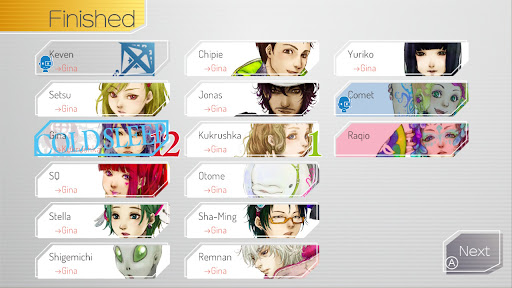
We all really hated Gina this round.
Loop 10
Soon the population expands to 15. Suddenly there are job roles with abilities, dramatically different personalities, and you can even take on the role of infected yourself. The gameplay is always the same though: Lie, kill, loop, die, loop, doubt, live, loop.
It’s hard to really describe what it’s like to play a loop of GNOSIA, and it’s understandable why I’ve come across reviews calling it an “AMONG US-like.” This description completely overlooks the writing and characters, but the game is just voting people out until you either get all the Gnosia (i.e. infected) out OR you make humans disappear one by one until you’re left with a Gnosia-infected ship.
There’s a whole level up system where you earn XP each loop that you can then use to level up five different stats, each playing some role in the game’s “debating round.” Charm makes you less likely to be the target of cold sleep, Charisma makes people more likely to follow your lead when doubting or covering for others, Intuition lets you catch lies easier. There are also “commands” you can use during debate that are locked behind certain skill levels. You need 25 Charm to use the “Regret” command, which works as a sort of counter when you’re being doubted that draws sympathy from other characters, building up your defense (Regret is an essential command, along with Seek Agreement). Some stats are definitely more useful than others, but it’s not so complicated that you’ll ever feel like you’re wasting your XP. The skill system is nice to have so that even a loop without story progression doesn’t feel like a total waste of time. That being said, there will be A LOT of looping where it feels like you have made no narrative progression whatsoever.
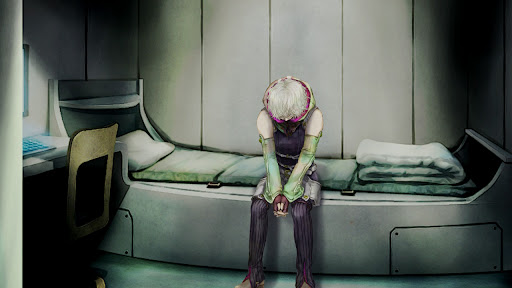
Me every time I got voted out in the first round
Loop 64
The killing game format has always had a problem with repetitiveness, its schtick is that someone is going to kill and someone is going to die, and the in-between moments are less of a concern. Having to replay the Zero Escape games multiple times to get the true ending always felt mundane. The Danganronpa series is able to escape this somewhat by being entirely linear, but still falls into moments of déjà vu in the interim periods between murders. What I’m saying is that killing games are a lot of the time just waiting for the next kill, but GNOSIA turns that on its head. What if what you’re mostly doing is killing, and the exciting parts are those brief moments when you aren’t? When you are actually GETTING TO KNOW someone?
Around Loop 10 I said something like “I can see this getting old,” but then I got an “event” moment where I could speak to a character and get a random fact about their life or where they came from. These moments can be so rare that even though they don’t advance the main plot immediately, they feel monumental in contrast to all the deception and doubt flying around. I boot up a loop and Gina comes into the room after eating, I learn she likes Japanese food: GINA DATA UPDATED. The rest of the loop plays out as normal and the entire loop as I’m picking the crew off as a Gnosia I’m wondering “what does Gina liking Japanese food MEAN?”
Whereas getting to know people and your fellow survivors/targets was always an important part of the genre (who cares about everybody dying if you aren’t able to learn about them), GNOSIA makes it the most exciting and important part of the game. You start trying to keep certain people alive in some loops regardless of their infection because you’re hoping to learn a little more about them. It morphs from a killing game into a social sim.
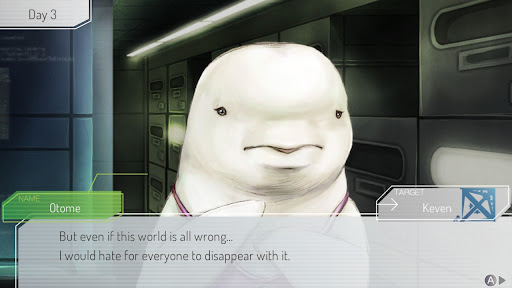
Oh sweet precious Otome
Loop 65
The actual narrative of GNOSIA is hard to describe. It goes places and does a good job of playing into both science fiction and anime tropes, only to eventually subvert them.
The narrative starts focused on the mystery of why you’re looping. You and Setsu (a non-binary crew member that wakes you from your sleeping pod) are the only two characters out of the 15 to retain memories of doing this over and over again. You occasionally check in on each other and exchange information about the cast and who to keep an eye on. Some of the characters take on more major roles, having knowledge about why the looping is happening or knowing who/what Gnosia are. It feels like there are five mysteries happening at once, on top of learning about each character’s backstory, which you’ll have to fill out in order to get the true ending. And although it was hard to keep track of everything going on, and there are definitely things that just don’t make sense even within its world, it was all incredibly interesting. The story was dark and unsettling at times, but it was ultimately a very human story about the fear of death and how far we’ll go to save ourselves and each other.
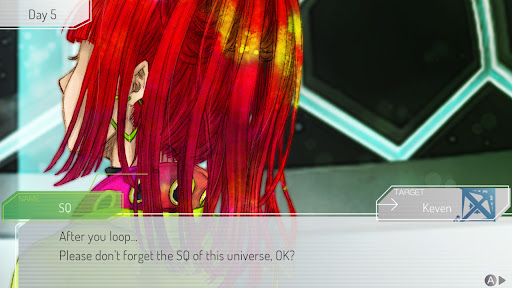
The repetitiveness of looping really makes you feel like you’ve lived so many different lives with these characters
Loop 88
The killing game has always shined because of its characters. There’s always a cast that you’re introduced to early on, and then slowly they begin to be picked off one by one. In this way, the killing games are framed as experiences of losing chances, about losing the people that you had gotten close to or were looking forward to getting to know more about. The story doesn’t expand, it narrows and narrows, and you slowly realize who are the people that were always going matter in the end.
While you are introduced to everybody pretty quickly in GNOSIA, the constant looping means that you are always guaranteed to see these people again, but that doesn’t make them any less valuable. In GNOSIA, everybody is a killer multiple times, and everybody is equally a victim. Someone being a murderer means nothing—even you are the murderer sometimes. But again, the game’s magnifying glass is focused on the acts of kindness and humanity, making very normal interactions feel incredibly important. By making a game out of killing, everything around it feels more important.
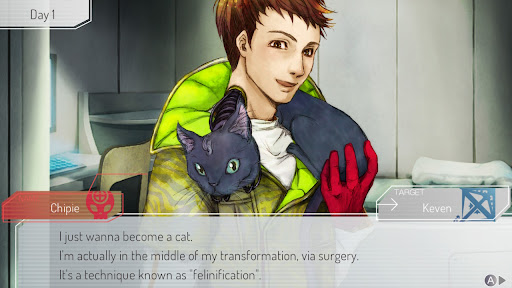
I need others to suffer through this image with me.
The cast at first feels like they’re there to fit an archetype or trope in either classic science fiction or anime. Eventually you start to uncover more and more about them, and realize that when they aren’t pointing fingers at each other, they also have their own fears, desires, and questions about their identity and life. You meet a beluga whale who just wants to be human, and sees mankind as a precious thing to be safeguarded. A clone fresh from a pod after a failed consciousness transfer process is now questioning what their role is if they’re not hosting someone else’s mind. There’s a woman who recently lost her mother and is having an existential crisis on top of having to question the humanity of everyone around her. There are also less dramatic character stories, like a dude who wants to be a cat, and a guy who likes monkeys and is also a pervert. The cast is varied, and while some definitely shine more than others, they all get a chance to make a mark on you at least briefly.
As you and Setsu experience the same day over and over again, you share stories about these people, remember them differently, and work together to find a way to save them all. It’s not just you both trying to save each other though, the other cast members occasionally do selfless acts of sacrifice in order to keep others alive. In one loop, Gina sacrifices herself to repair the ship in order to avoid a meteor belt. Every character has a different connection to life, and even the Gnosia storyline ultimately ends up being grounded in the idea of salvation and rescuing mankind from itself. It’s difficult to describe how emotional I would get when these characters talked about their lives and their beliefs, how they’re all just trying to find a life that feels fulfilling. In that search for life, you are also confronted with death, and naturally death begins to be imbued with its own aspirational meaning as well.
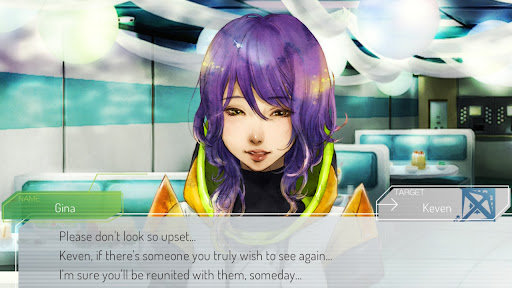
I’m already missing these sad freaks <3
Loop 121
Even if the ending plays as unsatisfying due to some plot holes and unresolved character arcs, I left GNOSIA feeling very hopeful. It’s rare to come across a game that is at once so dark and unsettling, while still feeling incredibly human and sweet. GNOSIA is frequently frustrating because of its formula, and it doesn’t always make it clear what you’re supposed to do to unlock certain information from people, but within that formula I can honestly say I have never played anything like it. It made me reflect on what I take for granted, repeating the same routines over and over again. I thought about what it meant to live in a GROUNDHOG DAY-esque purgatory, and how it wouldn’t be too bad if it meant being with someone I loved forever. But everything must come to an end, and all we can do is hope that it’s on our terms, and that we’re able to say goodbye to the ones we love when that time comes. And who knows, maybe we’ll see each other again someday, in another loop.
cialis pill For the past four years, the U.S. government has published the amount of money paid by pharmaceutical or medical device companies. The total for 2016 was $8 billion. The rewards were paid to 630,000 people.


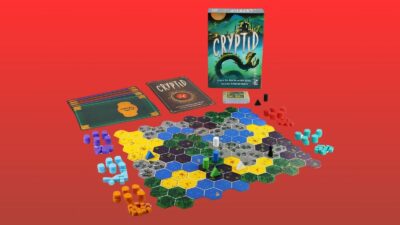

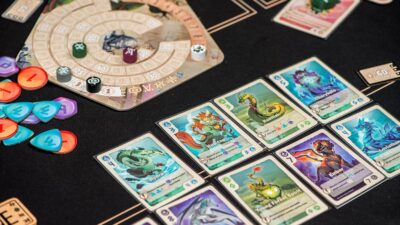
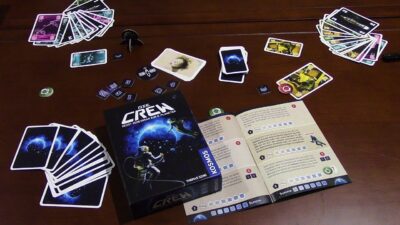
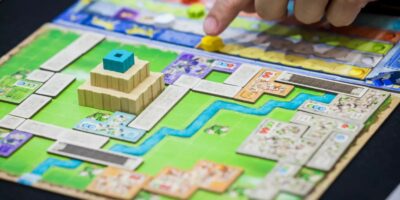

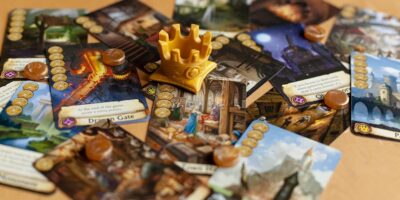
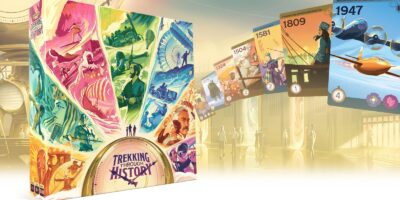

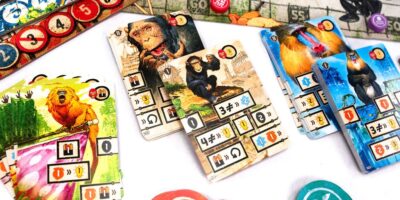




Comments